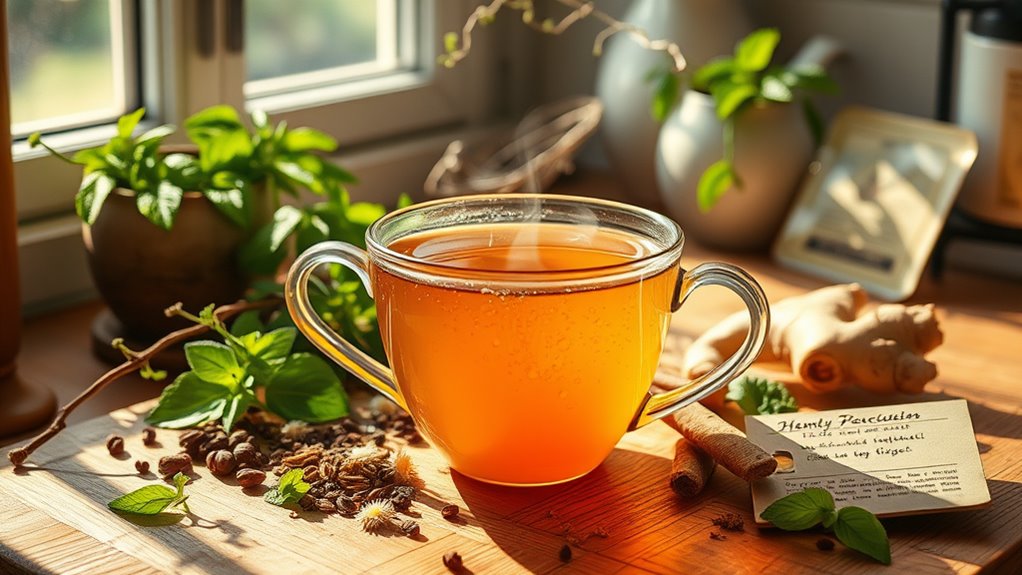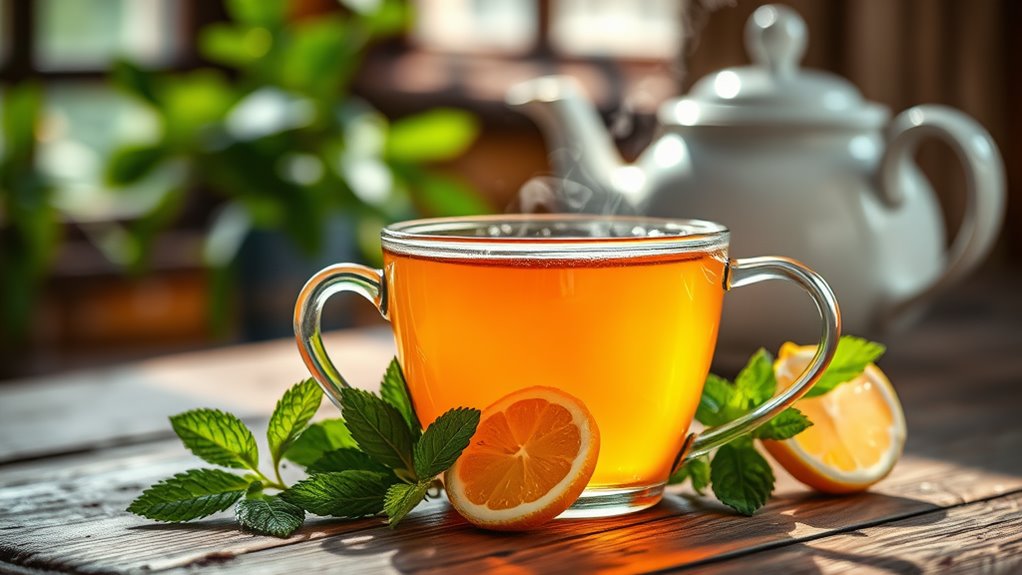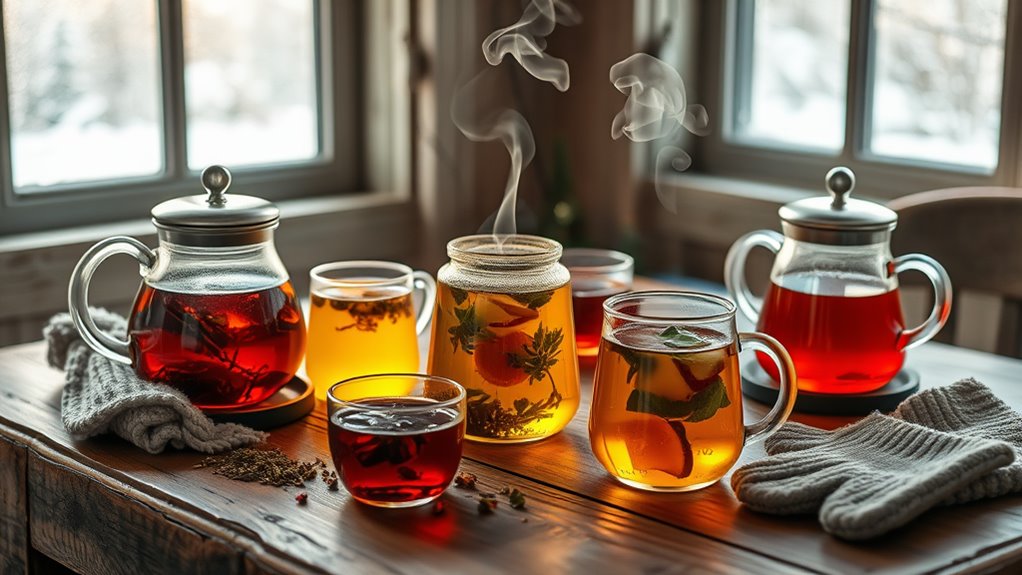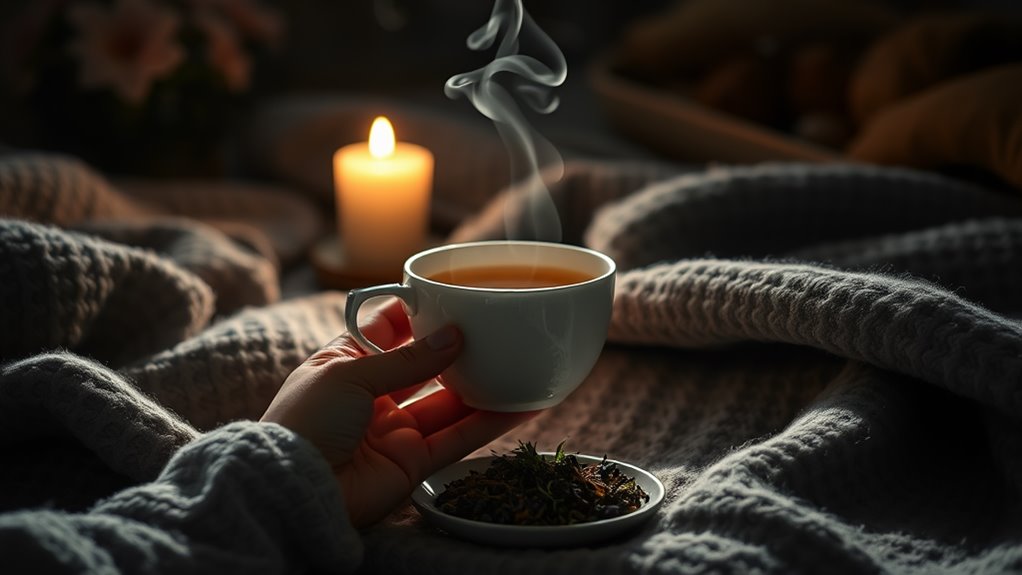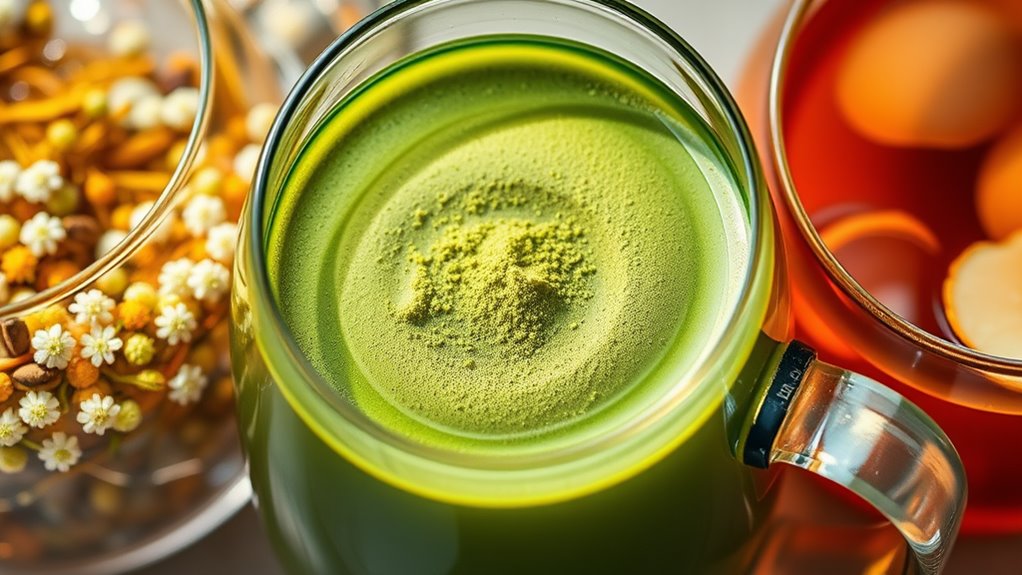A Healing Tea That’s Been Used for Generations
Herbal tea has been a cherished wellness remedy for generations, originating in ancient cultures like China and Egypt. These calming brews often combine various herbs, each serving unique healing purposes. For instance, chamomile relaxes your mind and promotes sleep, while ginger aids digestion. With numerous types offering varied benefits, you’ll find a perfect blend for your needs. Explore the rich history and health advantages of these traditional teas, and discover how they can enhance your wellness journey.
Key Takeaways
- Chamomile tea has been used for generations for its calming effects, promoting sleep and reducing anxiety.
- Ginger tea, known for its anti-inflammatory properties, has a rich history in traditional healing practices.
- Lemon balm tea has been utilized for centuries to reduce stress and enhance sleep quality.
- Rooibos tea is celebrated for its antioxidant power and has been a staple in South African healing traditions.
- Herbal teas, such as those mentioned, connect people to nature’s healing properties and holistic wellness practices.
The Origins of Herbal Tea
Herbal tea has a rich history that dates back thousands of years, with its origins rooted in ancient cultures. You might find it fascinating that traditional herbal tea was first brewed in China, where it was used for medicinal purposes.
Early practitioners discovered the benefits of various herbs, blending them to create soothing infusions. These brews became integral to daily life, promoting health and well-being.
As you explore different cultures, you’ll see that ancient Egyptians, Greeks, and Native Americans also embraced herbal tea, each developing unique blends tailored to their specific needs. Today, herbal teas for gut health continue to be celebrated for their ability to support digestion and enhance skin vitality.
Over time, traditional herbal tea evolved, but its essence remains the same: a beloved beverage that connects people to nature’s healing properties, offering comfort and nourishment throughout history.
Traditional Healing Practices
Throughout history, various cultures have relied on traditional healing practices to address ailments and promote overall wellness. These methods often emphasize the balance between body, mind, and spirit.
You might find these practices both fascinating and beneficial:
-
Herbal Remedies: Many cultures use local plants and herbs, believing in their natural healing properties to treat various conditions. For example, herbal tea blends are commonly used to promote relaxation and self-care.
-
Mind-Body Techniques: Practices such as meditation and yoga are employed to enhance mental clarity and reduce stress, acknowledging the connection between emotional and physical health.
-
Cultural Rituals: Traditional ceremonies or rituals often play a role in healing, fostering a sense of community and providing emotional support during times of distress.
Embracing these practices can offer a deeper understanding of holistic wellness and the interconnected nature of health.
Popular Types of Healing Teas
When it comes to healing teas, you’ll find a rich variety of herbal options that cater to different needs.
Each type offers unique benefits, drawn from traditional remedies that have been cherished for generations.
Let’s explore some of the most popular varieties and what they can do for your well-being. Incorporating herbal tea daily into your routine can enhance skin health and support digestion, providing you with a glowing complexion and a happy gut.
Herbal Tea Varieties
As you explore the world of healing teas, you’ll discover a diverse array of herbal tea varieties, each offering unique flavors and health benefits.
Here are three popular types to consider:
-
Chamomile: Known for its calming properties, chamomile tea can help reduce anxiety and promote sleep. Its gentle, floral taste makes it a favorite for evening relaxation.
-
Peppermint: This invigorating tea is perfect for soothing digestive issues. Its refreshing flavor not only wakes you up but also helps alleviate headaches and sinus congestion.
-
Ginger: Renowned for its warming qualities, ginger tea aids in digestion and boosts the immune system. Its spicy kick can invigorate your senses, especially during colder months.
With these varieties, you’ll find a healing tea that suits your needs perfectly.
Traditional Remedies Explored
While many modern remedies have emerged, traditional healing teas continue to play a vital role in holistic health practices around the world.
These time-honored brews offer a range of benefits that many swear by. For instance, chamomile tea is renowned for its calming properties, helping you unwind and promote better sleep. Ginger tea, with its warming effects, aids digestion and alleviates nausea. Peppermint tea can soothe headaches and relieve tension.
Meanwhile, green tea is packed with antioxidants, boosting your immune system. Each of these teas carries unique flavors and healing attributes, rooted in centuries of tradition.
The Health Benefits of Chamomile
Chamomile, often recognized for its soothing aroma, offers a wealth of health benefits that can significantly enhance your well-being.
Drinking chamomile tea is a time-honored practice that can support both your body and mind. Here are three key benefits you should know:
-
Promotes Sleep: Chamomile is well-known for its calming effects, helping you relax and fall asleep more easily.
-
Reduces Anxiety: The natural compounds in chamomile can help alleviate feelings of anxiety, promoting a sense of tranquility.
-
Supports Digestion: While avoiding specifics, chamomile can aid in digestive health, making it a comforting choice after meals.
Incorporating chamomile into your routine can provide these benefits, enhancing your overall health and wellness. Additionally, combining chamomile with calming ingredients like valerian root and lavender can further improve sleep quality.
Peppermint Tea for Digestion
If you’re seeking a natural way to support your digestive health, peppermint tea might just be the perfect addition to your routine. Known for its soothing properties, peppermint tea can help relieve bloating, gas, and indigestion. The menthol in peppermint relaxes the muscles of the gastrointestinal tract, making digestion smoother.
| Benefit | Description | How to Enjoy |
|---|---|---|
| Bloating Relief | Helps ease discomfort | Drink after meals |
| Gas Reduction | Reduces intestinal gas | Brew strong tea |
| Indigestion Aid | Supports healthy digestion | Mix with honey |
| Overall Comfort | Provides a calming effect | Sip before bedtime |
Incorporating peppermint tea into your daily routine can enhance your digestive well-being effectively.
Ginger Tea and Its Anti-Inflammatory Properties
Ginger tea is celebrated not just for its warming flavor, but also for its remarkable anti-inflammatory properties.
Traditionally used in various cultures to alleviate pain and reduce swelling, ginger has long been a staple in natural healing practices.
Health Benefits of Ginger
While many herbal teas offer health benefits, ginger tea stands out for its potent anti-inflammatory properties. Drinking ginger tea can provide relief from various ailments, making it a favorite among herbal remedies.
Here are three key health benefits you should know:
-
Reduces Muscle Pain: Ginger’s natural compounds can help alleviate soreness and discomfort after exercise or physical strain.
-
Eases Digestive Issues: It aids digestion, reducing bloating and gas, allowing for a more comfortable stomach.
-
Supports Immune Function: Ginger’s antioxidants can bolster your immune system, helping you fend off common colds and infections.
Incorporating ginger tea into your daily routine could be a simple yet effective way to enhance your overall health and well-being.
Traditional Uses of Ginger
Often celebrated for its health benefits, ginger has been a cornerstone of traditional medicine across various cultures for centuries.
You might find that ginger tea is particularly valued for its anti-inflammatory properties, making it a go-to remedy for ailments like arthritis and digestive issues. In many Asian cultures, people brew ginger tea to soothe sore throats and combat colds, while in Ayurvedic practices, it’s used to balance bodily energies.
Its warming nature can help stimulate circulation, promoting overall well-being. When you sip ginger tea, you’re not just enjoying a comforting beverage; you’re also connecting with a rich history of healing traditions.
Embracing this age-old remedy might just enhance your health and bring a sense of harmony to your life.
The Calming Effects of Lemon Balm
When you’re feeling overwhelmed or anxious, sipping on a cup of lemon balm tea can provide a soothing respite. This delightful herb, known for its calming properties, has been cherished for centuries.
You might find it beneficial for several reasons:
-
Stress Reduction: Lemon balm can help lower cortisol levels, promoting a sense of calm during stressful times.
-
Sleep Improvement: Drinking lemon balm tea before bedtime may enhance sleep quality, making it easier to drift off into a peaceful slumber.
-
Digestive Relief: The herb can ease digestive discomfort, which is often exacerbated by anxiety, allowing you to feel more at ease overall.
Incorporating lemon balm into your routine can be a gentle, effective way to find balance amidst life’s challenges.
Rooibos Tea and Antioxidant Power
Rooibos tea, a vibrant red herbal infusion from South Africa, is celebrated not only for its unique flavor but also for its impressive antioxidant properties. Packed with powerful antioxidants like aspalathin and nothofagin, this tea helps combat oxidative stress in your body.
By sipping rooibos, you’re not just indulging in a delightful beverage; you’re supporting your overall health. These antioxidants can protect your cells from damage, potentially reducing the risk of chronic diseases.
Plus, rooibos is caffeine-free, making it a perfect choice for any time of day. Whether you enjoy it hot or iced, incorporating this tea into your routine can be a simple yet effective way to enhance your well-being and enjoy its natural, soothing benefits.
The Role of Honey in Herbal Tea
When you’re enjoying a warm cup of herbal tea, adding honey not only enhances the flavor but also offers numerous benefits.
This natural sweetener is known for its antibacterial properties, making it a valuable addition to your wellness routine.
Natural Sweetener Benefits
Although many people enjoy herbal tea for its soothing properties, adding a natural sweetener like honey can enhance both the flavor and health benefits of your brew.
Honey not only adds sweetness but also complements the herbal ingredients beautifully. Here are some benefits of using honey in your tea:
-
Flavor Enhancement: Honey’s rich, complex flavors can elevate the taste of your herbal tea, making it more enjoyable.
-
Nutritional Value: Unlike refined sugars, honey contains vitamins, minerals, and antioxidants that can contribute to your overall wellness.
-
Natural Energy Boost: Honey provides a quick source of energy, making your tea not just a comforting drink but also a revitalizing one.
Incorporating honey into your herbal tea can transform your experience and promote better health.
Antibacterial Properties of Honey
While you sip on a warm cup of herbal tea, the addition of honey not only sweetens the brew but also brings along its remarkable antibacterial properties.
Honey, especially raw varieties, contains natural enzymes and antioxidants that combat harmful bacteria. Its low moisture content and acidic pH create an environment that inhibits microbial growth, making it an effective natural preservative.
When added to your tea, honey can soothe a sore throat and help reduce coughs, thanks to its ability to coat and protect mucous membranes.
Moreover, its healing properties have been cherished for centuries in traditional medicine, offering a delicious way to support your immune system.
Brewing Techniques for Maximum Benefits
To unlock the full potential of healing tea, understanding the right brewing techniques is essential. Here are three key steps to ensure you get the most benefits from your brew:
-
Water Temperature: Use water that’s just below boiling for delicate herbs like chamomile, while tougher roots like ginger need boiling water to extract their potency.
-
Steeping Time: Allow your tea to steep for the appropriate duration. Generally, 3-5 minutes works well for most herbal teas, but check specific guidelines for each type.
-
Quality Ingredients: Always use fresh, high-quality herbs and leaves. The fresher the ingredients, the more vibrant the flavor and health benefits.
The Future of Herbal Tea in Modern Wellness
As people increasingly seek natural remedies and holistic approaches to health, herbal tea is poised to play a significant role in modern wellness.
With its rich history and diverse benefits, herbal tea offers a comforting way to enhance well-being. You’ll find that teas like chamomile and peppermint address various ailments, from anxiety to digestion.
As more research highlights the therapeutic properties of these blends, you’re likely to see herbal tea gain prominence in health circles and wellness programs.
Additionally, the rise of sustainability practices will encourage local sourcing of herbs, making these teas not only beneficial for you but also for the planet.
Embracing herbal tea could be essential in your journey towards a healthier, more balanced lifestyle.
